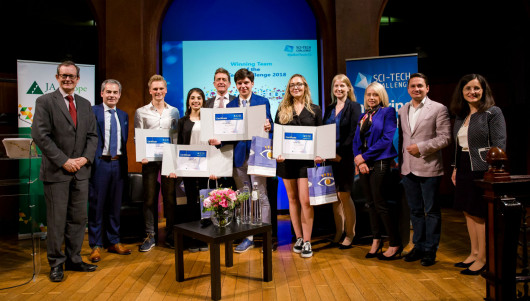An Innovative and Responsible Europe: Empowering young people
15-05-2019

According to the UN, quality education is the foundation to create sustainable development. Education and teachers’ empowerment are therefore considered as key factors in supporting youth as a globally connected engine for change.
Entrepreneurship education plays an important role in helping young people develop the skills, values, creativity and attitude needed for today’s challenges; while STEM (science, technology, engineering and mathematics) education provides the foundational knowledge to apply their ingenuity. Soft skills combined with an entrepreneurial mindset and deep understanding of applying knowledge empowers young people to become actors who can provide solutions to complex challenges.
The Sci-Tech Challenge (a partnership between JA Europe and ExxonMobil) is a programme designed to motivate students aged 15-18 to consider Science, Technology, Engineering and Maths (STEM)-oriented careers, raise their awareness of the importance of STEM skills and how they can be applied in enterprising ways to tackle the challenges of tomorrow. Furthermore, the programme helps raise awareness of energy-related issues and provides students with hands-on experiences in the application of STEM skills.
After national level competition, the winners of the Sci-Tech Challenge will meet in Brussels for the final stage of the competition. This year’s challenge is creating a plan to upgrade and modernise Brussels’ inner-city transport network in a cost-effective way, while reducing the environmental impact.
EURACTIV invites you to the Grand Finale of the contest, where students will present their solutions to a wider audience of various stakeholders and elaborate with the jury members on the main impact of their solutions and how they could apply it in the future. The panel debate will touch on questions such as:
- How can entrepreneurship and STEM education help to solve today’s complex challenges, such as balancing the need for social progress and economic growth while managing environmental impact?
- Where are the best-practice examples of how education is helping to develop effective solutions?
- How do the roles of policy and citizens support each other in addressing these challenges?
- How important is it to introduce entrepreneurship education into schools from earlier ages?
Supported by:


Location
Permanent Representation of Romania to the EU
Avenue de Cortenbergh 107, 1000 Bruxelles
Google Maps >>
Panellists
Jury:
Nikolaas Baeckelmans, Vice President of EU Affairs, ExxonMobil
Holger Krahmer, Head of EU Affairs, Daimler
Fuensanta Martinez Sans, Transport Policy Director, European Automobile Manufacturers' Association (ACEA)
Sam Morgan, Transport Editor, EURACTIV
Panellists:
Stefan Radu Oprea, Minister Business Environment, Trade and Entrepreneurship of Romania
Said El Khadraoui, Adviser, European Political Strategy Centre, European Commission
Caroline Jenner, CEO, JA Europe
Liliana Preoteasa, Director, Ministry of National Education, Romania
Philippe Ducom, President ExxonMobil Europe, ExxonMobil
Moderator
Brian Maguire, Journalist, EURACTIV
Chair
Dan Luca, Senior Director, EURACTIV
Schedule
10.30 - 11.15 Registration
11.15 – 11.20 Welcome by EURACTIV
11.20 – 11.50 Team presentations
11.50 – 12.35 Panel debate
12.35 – 13.00 Award ceremony
13.00 – 13.10 Closing remarks
13.10 – 14.00 Networking lunch
Contact
Simona Ovesea
simona.ovesea@euractiv.com
+32 (0)2 788 36 86





